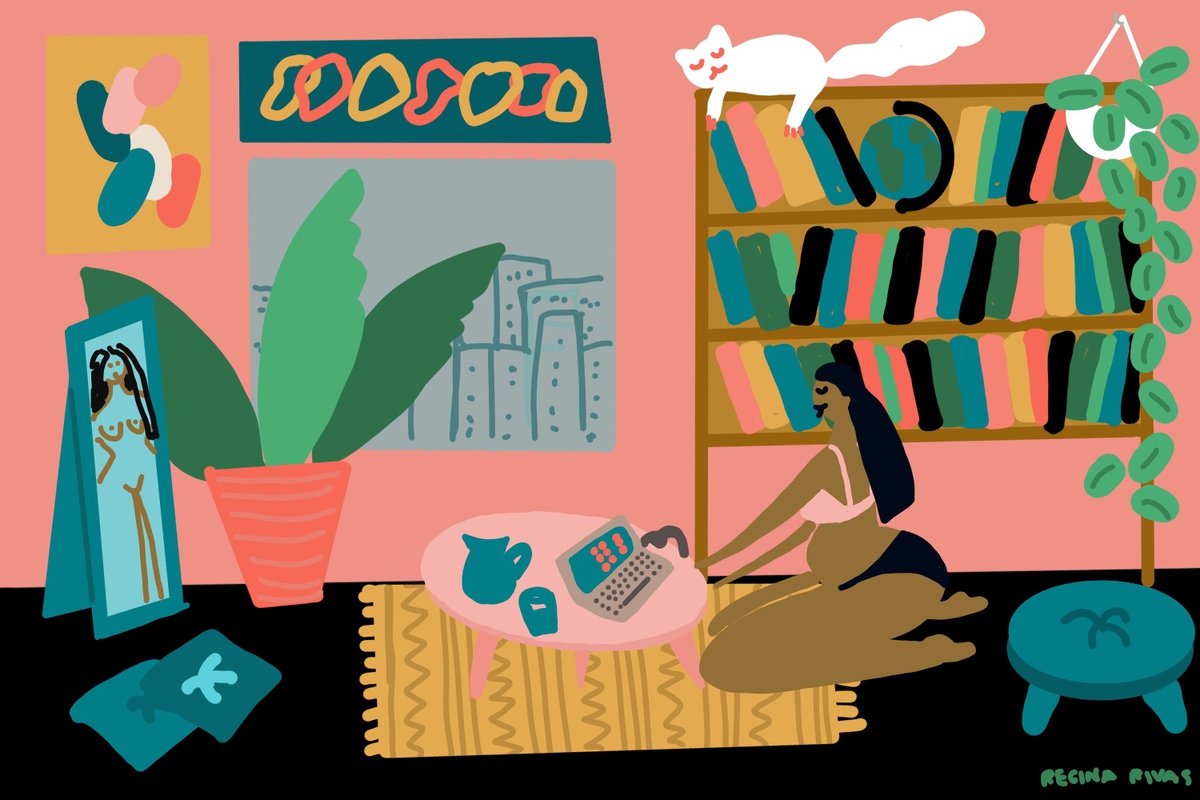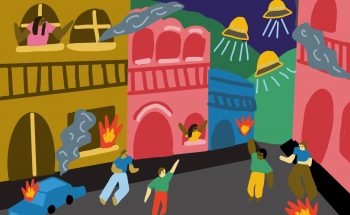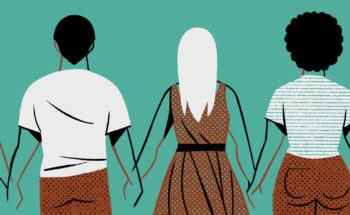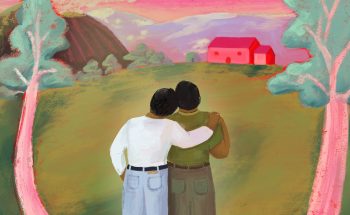
On ugliness – Translation
Share:
[Daniel Alarcón, host]: A little over three years ago, we published the first episodes of Radio Ambulante on NPR. We knew that being a part of American public radio would give us a big push. And we weren’t wrong. We’ve grown as a team —back then we were only five; now we’re over twenty. And we’ve also grown a lot as a community: now there are hundreds of thousands of Ambulantes listening from all around the world.
If you want to see us continue growing and }want to support Radio Ambulante’s next stage, there are several ways to help. We have a membership program, we have a new app for those listeners who are learning Spanish, and, for those of you listening from the US, please consider supporting your local public radio station. You can do it by going to the website donate.npr.org/RadioAmbulante. Donate is spelled: D-O-N-A-T-E. Donate, in English. Again that’s donate.npr.org/RadioAmbulante.
Thank you very much for your support!
[Lupa]: Surely this has happened to you: you listen to an episode of this wonderful podcast and you think, “Oh my god, Randy would love this”. Or Joanne or Connie or Matthew. And then, “Ay, caramba! But with his two semesters of Spanish, my gringuito won’t understand”. Well, my lovelies, I have wonderful news: Radio Ambulante now has its own app for all the Matthews in your life. You can use these incredible stories to improve your Spanish. The app is called Lupa. There’s more information in the website. Be on the lookout. Chao, my lovelies!
[Daniel]: Welcome to Radio Ambulante, from NPR. I’m Daniel Alarcón. Today we’re going back to our archives, to a story we published originally in 2016. And, well, let’s start with…
[Gabriela Wiener, producer]: Uh, my name is Gabriela Wiener. I’m Peruvian, I’m a writer. I have a daughter and a baby boy. And I have two partners: a boyfriend and a girlfriend. Mmm… And that’s it.
[Laughter]
[Gabriela]: What?
[Camila Segura, editor]: No, totally normal.
[Laughter]
[Gabriela]: Anything else? I don’t know what… else. Should I say more?
[Daniel]: No, that’s perfect… It’s perfect.
Gabriela has been my friend for more than a decade. She is short —she’s about 5’3”. She is a brunette…
[Gabriela]: And I have small eyes. I have the kind of mouth you see, I don’t know, drawn in comics.
[Daniel]: She has very long, straight, black hair and she hasn’t changed her haircut for as long as I have known her.
[Gabriela]: And I have a bit of a… a belly, which I’ve always had, as if I were four months pregnant. I’m a little stocky, I think. And that’s it: I bite my nails and do those things.
[Daniel]: It has always seemed to me that Gabriela is one of the most self-assured people I know. I have always felt like when she walks into a party, she can go home with anyone. A man or a woman.
That’s why I was surprised to hear that she has always considered herself ugly.
Ugly? But if she has not one, but two partners: Jaime and Rocío. Isn’t that a success? So, well, I asked her.
[Gabriela]: Yeah, the truth is that my boyfriend is considered classically handsome, you know? And… and my girlfriend is pretty attractive too and… uh, sometimes I think I’m just lucky, or that it’s some sort of cosmic irony.
[Daniel]: Camila Segura and I spoke with Gabriela to understand her a little better, so she could explain some more where these feelings come from and how they have affected her.
[Gabriela]: My friends and I, uh, the three of us, grade-schoolers, we had a huge crush on the principal’s son. He was tiny, I mean, he was always first in line because he was the shortest one. He had brownish hair… uhm, I guess he was like the “fair skinned one.” He had a sweet face and he was shy and quiet.
But in any case, we were smitten, you know? With… with his small size and with… with the fact that he really wouldn’t hurt a fly, and that he wasn’t your typical handsome seducer, and all that. But he was the… the sweet, little, handsome boy.
[Daniel]: And well, according to Gabi, this little prince charming…
[Gabriela]: He wanted nothing, absolutely nothing to do with me uh, and he liked one of my friends more than me. Uh, but at one point he told someone: “If Gabriela were white, I would like her,” you know?
Uhm, so immediately I imagined myself, and I think I did for a good while, I imagined myself exactly as I was, but white, you know? And I thought: “Geez, I… I would be prettier then, right? If I were white.” And I was tricked into feeling that way for a long time, you know? As if the problem was the color of my skin, you know?
[Daniel]: Other people probably wouldn’t have paid so much attention to these things. But for Gabriela…
[Gabriela]: I, however, can still remember it and when I tell the story there is probably something that still resonates with me. A noise, you know?
[Daniel]: Do you remember the first time you felt ugly?
[Gabriela]: Yes. I was, uh, a little girl, who from a very young age, did really well in school ,you know? Very intelligent, etcetera. And throughout grade school I was a pretty popular girl, but at the same time —paradoxically— I was pretty poorly treated. Uh, and it was always for the same reason, you know? Because of the color of my skin.
Uh, and it was interesting, because they… they called me black. I mean, anyone who sees me would think I’m more indigenous or… or mochica, not black, you know? But the kids called me black, they called me a monkey, etcetera. And that frustrated me. To me, that meant being ugly, you know? It meant being on the… on the sad and failing end, you know? Of life. And so I turned into a very introverted and very shy girl.
[Daniel]: Which doesn’t make sense to those of us who know Gabi. Her public image is the complete opposite. But…
[Gabriela]: Then I remember very well going home when I was very little feeling really sad, crying with my mother and telling her the things they’d said to me at school, you know? On the playground. And when I went home crying, my mom tried to convince me that I was a pretty girl, you know? She would always say to me: “But you are pretty,” you know?
My parents were sending me this message and the whole time I thought they were lying to me. So I grew up a little with this somewhat contradictory idea, you know? About what they tell you in the outside world, you know? In public, and what they tell you in… in… in private, you know?
And all the while, I didn’t have a boyfriend or someone to tell me that I was pretty, well… I needed to get recognition from the outside. What I was getting from the inside wasn’t enough.
I think I started considering myself pretty just recently, when someone started saying so, you know? I mean, with my first boyfriends. But to suddenly have a boyfriend, or to be liked by a boy or whatever, always surprised me. I still get surprised: you just asked me “hey, you have two partners…” and it still seems a little surprising to me.
[Gabriela]: Hello, Rosi
[Rocío]: Hello.
[Gabriela]: Listen, I wanted to ask you something.
[Rocío]: Go ahead…
[Gabriela]: Yesterday I interviewed Jaime and Rocío. And… and both of them, uh, well, said what you’d expect.
Did you think I was pretty when you met me?
[Rocío]: Yes. I can remember when we met perfectly. When you came up to our group of friends, uh, I thought you were very pretty, very attractive.
[Gabriela]: That from day one, they thought I was pretty. That they liked everything about me [laughs], that they wouldn’t change anything…
[Jaime]: I’ve always been a big, big fan of your boobs, for example. But also your legs, your eyes, your mouth: the shape of your mouth is gorgeous to me. And your hair is spectacular too…
[Gabriela]: That they wouldn’t change a thing about me.
[Rocío]: Oh, nothing. There’s not one thing I don’t like.
[Daniel]: Well, almost nothing…
[Rocío]: Well, it’d be nice if you were a little taller.
[Gabriela]: You think I’m short.
[Rocío]: No, no… Not short.
[Gabriela]: We’re almost the same height.
[Rocío]: Well, I don’t know, it was just to say something.
[Gabriela]: What do you like the least about me? If you could change one thing about my body or face, what would you change?
[Jaime]: I think if I said I would change something about you, well, you would stop being you. So I couldn’t change anything about you because that could cause a catastrophe somewhere inside me.
[Gabriela]: It seems to me that with all of the questions I’ve asked you, I’m still not fully convinced. As if you haven’t said what you really feel… or as if you don’t really think I’m that pretty. I don’t know, it’s like I don’t believe you. I don’t know, I feel like I don’t believe you.
[Laughs]
[Jaime]: That is one of the ugliest laughs I’ve ever heard in my life, for example. [Laughs] Well, you know it’s like that… You know it’s like that.
[Daniel]: We will come back after a small break.
[It’s Been a Minute]: It’s Been a Minute is a talk show with heart. Every week, they interview people who deserve your attention — and at the end of every week, they wrap up the news with other journalists. Listen to It’s Been a Minute from NPR as they make sense of the world through conversation.
[Jorge Caraballo, Growth Editor]: Hi, I’m Jorge Caraballo, Growth Editor at Radio Ambulante, and we want to remind you that there are many ways for you to support us. Whether it’s via the membership program or via Lupa, the app for those learning Spanish. And, if you’re in the United States, we want to invite your support your local radio station. You can do it by going to the website donate.npr.org/RadioAmbulante. Donate is spelled: D-O-N-A-T-E. Donate, in English. Again that’s donate.npr.org/Radio Ambulante. Thank you very much!
Well, before the break we were talking to Gabriela Wiener. Maybe some of you have read her work. Maybe not. Basically, what happened was that in 2008 she published a book called Sexografías. It’s a book with different chronicles, portraits of people who pursue pleasure and aren’t ashamed of it. People like herself. And when the book came out, she created a blog with the same name: Sexografías.
[Gabriela]: So that’s where I was posting all of the press releases and reviews… Well, I was really excited because it was my first book, you know? And…
[Daniel]: And from time to time, she’d google her name to see what showed up and see if it was worth putting it up on her blog.
[Gabriela]: But I never imagined, you know? That I would find myself, effectively, back… back in school, but turned into a kind of… of hell, you know? And in… directly back in the mistreatment and the most crude, you know? And violent insult, you know? A terrible violence thrown at my face for the same reasons people had called me names when I was a girl, you know?
[Daniel]: What she’s referring to are the so called trolls. Those anonymous, dastardly people who dedicate themselves to attacking others on the internet. And Gabi became a collector of the most atrocious comments.
[Gabriela]: Let’s see, if you go to my blog, I… I chose a few and posted them… Look, type in “sexografiasblogspot”…
[Daniel]: I asked her to read me some of those comments. And I want to warn you that you’re about to hear some of the worst things you can imagine.
[Gabriela]: Let’s see, hold on… Blogspot…
“Poor little indian sudaca [a derogatory term to refer to South Americans] who only knows how to be a huge slut.”
“How embarrassing is Peru and its indians when they start doing dumb shit.”
“That dumb bitch is so ugly, you could only fuck her with a bag over her head.”
“That Gabriela is horny because with a face like that not even my dog would fuck her.”
“Slut, monster, piece of shit, ugly and crazy. Liking sex is one thing, being promiscuous is another. I would never fuck that. Such an ugly broad.”
“That girl needs surgery from head to toe.”
The same things that had made me cry, you know? That you’re indian, that you’re ugly, that you’re a whore, you know? The same as always, you know?
[Daniel]: I want to apologize for… for asking you to read all of those again… I mean, how disgusting.
[Gabriela]: Yes. Well, the truth is that in 2009 these things hit me… me really hard, you know? They really made me cry. And now I’m a lot tougher, you now? When confronted with these things and I think that a lot of women who get comments on Twitter or on Facebook or… now we’re, I don’t know, vaccinated enough against… against the trolls and against these things. But it’s always hurtful, I won’t deny that. It’s always hurtful, you know?
[Daniel]: Of course it’s hurtful. It hurts me. And well, this whole story started because a short while back I read a very moving essay that Gabi wrote about this same subject, and that was where I got the idea to bring her to the studio. So we thought it would be a good idea to share a portion of the essay with you. Here it goes:
[Gabriela]: I suffer from body dysmorphic disorder. Which means I am obsessively concerned with something that I consider to be a defect in my physical characteristics. The most upsetting part of an illness like this is that the defect can be either real or imaginary. It is not clear who or what determines what is evidence or what is a pure fabrication. It’s as if you were something in between the monsters out of nightmares, in between those kids born with two faces, those babies who are born with their siblings coming out of their stomachs or those cats with six legs. The evil is there, and so is the deformity and the putrefaction.
No one can make me feel worse than I can, I think. That is my conquest. My inner voice is always a run-down of catastrophes and barroquism. My crooked teeth. My black knees. My fat arms. My sagging breasts. My small eyes pinned on top of two dark circles. My shiny and pimply nose. My witch’s black hairs. My glasses. My nascent hump and my incipient double chin. My scars. My swollen hairy armpits. My blotchy pecked skin. My little black hands with gnawed on fingernails. My lack of a waistline and curves.
My flat ass. My extra ten pounds. My bristly pubic hairs. The hair on my anus. My big brown nipples. My drooping, stretched-out abdomen. The sound of my voice. My breath. The smell of my vagina, my blood, my stench. And I still haven’t even gotten old. And started to decompose.
There was a time I would draw myself. I would make collages out of pictures that I had cut out. I would put together parts of my imperfect body with clippings of sculptural models. In one of my self-portraits I have a ruby on my nipple and my body is the heroine’s body of an erotic comic book from the 70s. I am a three-headed paper doll whose body I have cut off and who I have left dressed.
No one wants to be nice. No woman wants to be just friendly. There are few things as useless as inner-beauty. A few times I have taken up the task of aesthetically judging others, like a great expert. We all know that for really beautiful people this is no topic of conversation. Attractive people don’t realize how attractive they are. But for ugly people it’s not either. For them it’s not a topic: it’s the only topic. In fact, anyone who doesn’t talk about other people’s bodies, even if they aren’t attractive at all, can consider themselves a little attractive just for staying out of it. However, regular people, even semi-attractive people, make themselves ugly by talking about the beauty or ugliness of other people.
Am I crazy? I don’t think that many people are attracted to me at first glance. So much so, that when it happens I am surprised, and that can be very upsetting in a world where almost half the population has a story of love at first sight. And of course, when people get to know me, they do see my good qualities, like my large breasts, my shiny black hair, my small mouth drawn with that glint of eroticism and defenselessness. Most of all, when I’m naked I look like a recently captured Amazon. That’s arousing, in a colonial way. That’s what my lovers and friends say, who can sometimes be ugly geniuses.
I think that if my lovers and friends are ugly, that’s also my problem. They make me uglier. The same thing happens when I write: the things I write always make me ugly. I won’t discuss here the hatred I have for female writers who, on top of writing well, are feminine wonders. I have one buried in my backyard. Beauty kills.
Being a topic of conversation, a theme, a post offered up for public ridicule. In a picture someone posted on an anonymous blog, I was sitting on the ground, eating a banana. Then there are 395 comments that call me ugly or in which they —mostly men— detail how I cheated while I was married and what a whore I am in general. The part about being a whore never hurt me all that much; let’s not waste time on that. But the rest, the rest is evidence.
Once I hated myself like that too. If body dysmorphia is a mental illness, am I imagining it all? Am I ugly? Am I actually beautiful? If I am imagining it, why are people talking about it? Writing about my ugliness. Why is that a topic? Why does a beautiful man love me? Should I be beautiful? Do they want me to be beautiful so they can justify their pain, their appetite, their virulence? In that case, does it have more to do with my moral impurity than my body? Wasn’t I pretty, like my mom and dad said? Is it a mix of the two? Am I crazy for asking myself these questions? No one else does?
There’s a drawing. A little vignette I made one day out of something said to me by someone who loves me despite my issues, my complexes, or precisely because of them. He said: “I wish I’d known you as a little girl. I would’ve told you you were the prettiest girl in the world”. In my drawing, he goes back in time, finds me, I sit on his knee, and since he is the most beautiful man I’ve ever seen, he says that phrase in my ear and I believe him. And I would never forget it. So, in my alternate life story, I would grow up without that disorder and I wouldn’t ask myself those questions anymore.
[Daniel]: Hearing that breaks my heart. Because, of course, how many women like Gabi must feel that way? But I also asked her if there had been times when she felt beautiful.
[Gabriela]: The usual: you feel pretty when someone says you’ve lost weight after having the stomach flu or after being depressed or sad. You also feel pretty about ordinary things, you know?
There is one time I always feel pretty, and that’s around the fourth or fifth drink and I go into the bathroom and I look in the mirror and I look gorgeous. What’s more, that’s definitely when I take off my glasses because at that point I don’t see very well —with or without my glasses— and I look at myself and I go back to the… to the bar feeling like a total knock-out. And I really think I look beautiful. I don’t know why. It’s a kind of… The alcohol, too, is a kind of beautifier. I guess it has to do with that, with the confidence, but I’d say that it’s something verifiable, you know? I mean, there are photos. There are photos. [Laughs] There are photos. There are photos of that moment and yes, I looked beautiful.
[Daniel]: Ok —I said— but without alcohol?
[Gabriela]: Well, I have felt very pretty when I have felt loved.
[Daniel]: Which can be dangerous, can’t it?
[Gabriela]: On the hand it’s… it’s incredible seeing yourself in the eyes of another person and seeing yourself as beautiful because of that love. But on the other hand, it’s a trick because it’s like depending on something external to confirm that you are worthy, you know ? Attractive, you know? But it also seems very human to me and very logical that… that this happens, you know? I think this happens all the time.
[Daniel]: And of course, taking that into account, the only lasting solution is the internal process of believing it yourself, of learning to accept yourself as you are. And perhaps the most encouraging part of our conversation with Gabi was when she told me this: that it is possible, that you can eventually come to peace with the face and the body you have.
[Gabriela]: I’ve stopped using things that I really depended on and gave me that security of feeling pretty, it was four things. No, two: my eyelash curler, because I have very short, fine and low eye-lashes, and some powders, like Michael Jackson, to even out all my marks, spots, sweats and shines.
[Daniel]: And even though it may not seem like it, something like that can be revolutionary.
[Gabriela]: Because sometimes you start to depend on a few things that you think make you totally beautiful, and all of sudden you stop using them and you’re still the same, you know?
[Daniel]: Gabriela Wiener is a Peruvian journalist, and she lives in Madrid. Her latest book is Dicen de mí.
Camila Segura, Silvia Viñas and I edited this story. The sound design is by Andrés Azpiri, with music by Luis Maurette.
The Radio Ambulante team includes Lisette Arévalo, Gabriela Brenes, Jorge Caraballo, Victoria Estrada, Miranda Mazariegos, Patrick Moseley, Laura Rojas Aponte, Barbara Sawhill, Luis Trelles, David Trujillo, Luis Fernando Vargas and Elsa Liliana Ulloa. Carolina Guerrero is our CEO.
Radio Ambulante is a podcast by Radio Ambulante Estudios, and it’s produced and mixed on the program Hindenburg PRO.
Radio Ambulante tells the stories of Latin America. I’m Daniel Alarcón. Thanks for listening.
Friends, happy holidays and a happy new year. We’re going on a break until January 14th, but when we come back we’re going to Quito, Ecuador in 1949.
[Presenter]: We interrupt tonight’s musical programming to deliver an emergency news cable.
[Daniel]: The day a radio station started reporting that Martians had invaded the country.
[Presenter]: According to a report from our correspondents, a huge ball of smoke and fire has descended on the city of Latacunga.
[Mercedes Gross]: I clearly remember them saying: “They’re coming. It’s a gigantic fleet.”
[Daniel]: How did Quiteños react to that news? Listen, on the next episode of Radio Ambulante. Happy new year!





